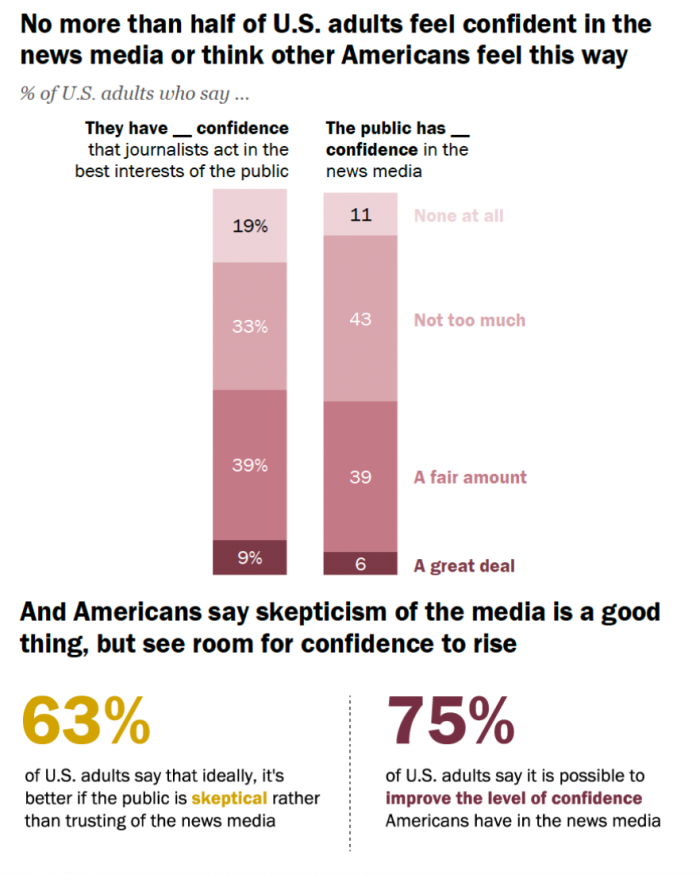In a year marked by protests sparked by racial injustice and high-profile newsroom uprisings over coverage and representation, a new Pew Research Center analysis found that Black Americans are much more likely to say it’s important to see themselves reflected in coverage — and newsroom staff photos — than other Americans.
This Pew Research Center analysis — based on interviews with 10,300 adults between February and March 2020 — is the final installment of a yearlong study of Americans’ views of the news media.
Here are a few of our takeaways:
Nearly seven out of every ten Black adults (68%) said it’s important for news outlets to “cover people like me in stories.” Forty-one percent of white adults and 54% of Hispanic adults said the same thing.
Both Black (38%) and Hispanic (33%) adults were also more likely than white adults (13%) to say it’s important that “journalists look or sound like me.” Most major newsrooms — even in diverse cities like New York, Los Angeles, and Washington, D.C. — are overwhelmingly white.A Black man in his sixties, who participated in one of the focus groups, said, “In terms of being fully diverse, in terms of staff, it’s very important to me, I’m able to have my kids see individuals like themselves, too.”
Americans of all races were more united on other factors — like whether the journalists seem friendly, approachable, share their views, and easily reachable — that help them decide where to get their news from. (Of those, journalists seeming to share the respondent’s views and appearing “friendly and warm” were more important.)

A little less than half (48%) of U.S. adults say they have “a fair amount” or “great deal” of confidence that journalists act in the best interests of the public. Nearly one in five (19%), however, report they have “none at all.”

How does that compare with the confidence that Americans have in other professions? Among the ten groups asked about, seven (medical scientists, scientists in general, the military, public school principals, police officers, college professors, and religious leaders) were ranked higher than journalists. Reporters received the same marks as business leaders and ranked higher than just one group: elected leaders.
Interestingly, 63 percent of Americans think this skepticism is a good thing. About two-thirds said society benefits if the public is skeptical of the news media. This thinking applies across party lines: a majority of Republicans (70%) and Democrats (56%) believe that the news media should be approached with skepticism rather than trust.
A full 80 percent of Americans think the news they receive is influenced “somewhat” or “a great deal” by financial and corporate interests. Relatedly, more than 70 percent said news organizations don’t explain where their money comes from.

Issuing corrections was the only transparency metric that news organizations are seen to be doing “very” or “somewhat” well. (Still — the study also found that 69 percent of U.S. adults think news organizations try to “cover up their mistakes” rather than admit them.)
Republicans — and Republicans who approve of President Trump, in particular — are much more likely to believe that errors in news coverage stem from careless reporting or even an intention to mislead.
Much more so than Democrats, many Republicans generally go into news stories expecting they will be inaccurate. But they also go a step further: There is a deep sense among Republicans that ill will leads to mistakes in news stories.
Republicans are about twice as likely as Democrats to say that a major reason significant mistakes happen in news stories is that there is a desire to mislead audiences (60% vs. 32%). And about two-thirds of Republicans (67%) say careless reporting is a major reason, compared with 46% of Democrats.
More than half of Democrats, on the other hand, think the fast pace of breaking news is a major reason why mistakes can be found in news stories.
The Pew Research Center previously found that “Americans who feel connected to news outlets — whether in feeling valued by, understood by or loyal to them — express far more positive views toward the news media.” This new report indicates that news organizations are failing to create that connection with young adults.
Younger Americans (18 to 29 years old) were the least likely of all age groups to be loyal to their news sources (23%), feel their news sources value them (29%), and feel news organizations “understand people like them.”
A similar story applies to the roughly 20% of Americans who rely on social media for political news. This group skews younger but even accounting for age differences, those who rely on social media for political updates are “less likely to feel loyal to or valued by their sources of news” than those who rely on television, print, radio, or news websites.
The full report is here.
3 comments:
Thanks a lot for providing individuals with an extraordinarily wonderful possiblity to check tips from this web site. It’s usually so pleasant and as well , jam-packed with a lot of fun for me and my office acquaintances to visit your blog not less than three times weekly to study the fresh items you will have. And definitely, we are at all times motivated for the very good suggestions you serve. Selected 3 ideas in this posting are honestly the most impressive we’ve had.
This actually answered my downside, thank you!
One important thing is that when you find yourself searching for a education loan you may find that you will want a co-signer. There are many situations where this is true because you will find that you do not possess a past credit rating so the bank will require that you have someone cosign the borrowed funds for you. Interesting post.
Trackbacks:
Leave a comment